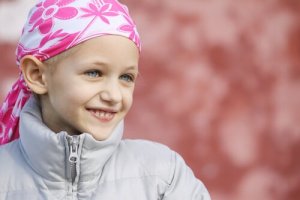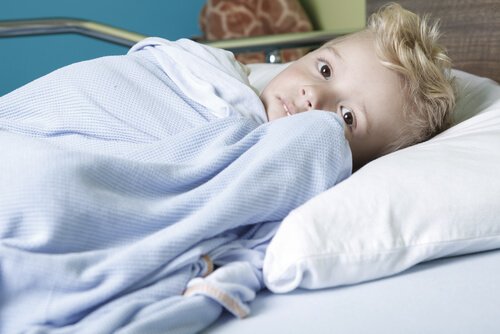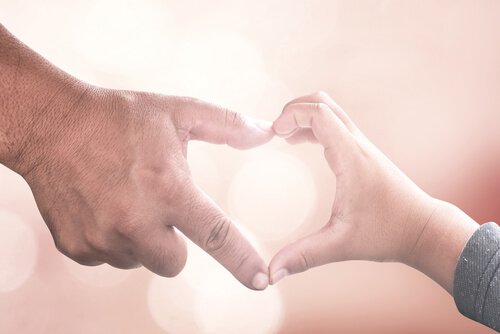Kids with Cancer - How to Improve Their Quality of Life


Written and verified by the psychologist Gema Sánchez Cuevas
Every year, 900 children under the age of 15 are diagnosed with cancer. Fortunately, medical advances are allowing for a longer lifespan. But it’s not only important to cure the disease. It’s also essential to pay attention to quality of life.
The side effects of the illness and the treatments involved must be in the spotlight. For this reason, it’s important to gather the most effective psychological techniques to reduce any suffering. Also, it’s advisable to know what the most appropriate interventions are to reduce anxiety and depression in children. We must always attempt to improve their quality of life, both during the process of the illness as well as in remission.
Kids with cancer – how does this disease impact them?
Children with cancer suffer as many physical symptoms as psychological ones. Among the physical symptoms are vomiting, weight loss, fatigue, etc. On an emotional level, kids with cancer face feelings of rage, fear, loneliness, or anxiety.
Depending on the age at which the diagnosis is made, the illness can manifest in different ways. Among younger children, what stands out is their worry about the pain and fear of separating from their parents. In older children, feelings of loneliness begin to arise. Teenagers experience a fear of death and stress related to the physical changes.

Pain is one of the most frequent concerns. This pain can originate from the disease itself or appear due to medical procedures. For example, bone marrow aspirations and biopsies are very painful and require frequent procedures.
Kids with cancer also have to be exposed to procedures such as radiation therapy, chemotherapy, or blood draws, which are considered even more painful than the disease itself. Plus, sleep disorders, fatigue, anxiety issues, depression, and social problems are also quite common.
Psychological intervention in children with cancer
Knowing the diagnosis generates a very strong psychological impact on the family. After which, the question arises whether or not to let the child know. In these cases, consulting with a specialist about what to do and how to do it can help both the family and the child.
A cancer diagnosis is a very delicate situation which requires a lot of comprehension, delicacy, and, above all, support.
Here’s a set of treatments that have proven their effectiveness on numerous occasions. In order to ease comprehension, we’ll break down the main symptoms we mentioned with their usual treatments.
- Reduction of nausea and vomiting – progressive muscular relaxation with guided images, hypnosis, and systematic desensitization.
- Pain control – distraction, the use of imagination, breathing and relaxation training, positive reinforcement, musical therapy, or hypnosis.
- Fatigue reduction – distraction and planning of activities based on priority.
- Anxiety treatments – breathing and relaxation techniques, the visualization of pleasant scenes, reinforcement of appropriate behaviors, differential reinforcements, and positive self-verbalization.
- Treatments for depression – emotional education, pleasant activities, and cognitive restructuring.
Adapting to a new life after beating cancer
The current survival rate for children with cancer is almost 80%. This is a hopeful piece of data, and science aspires to reach 100% through advances in different kinds of treatments. But what does it really mean to be a cancer survivor?
Cancer is a disease characterized, among other things, by long periods of hospitalization. The youngest patients stop going to school, can barely see their classmates or teachers, and contact with the outside world becomes minimal. This makes their social circle very small. Thus, they may go through some difficulties when the time comes to reincorporate into society.

Rejoining their classmates
Going back to school, for example, is a complicated process. Both the children as well as their parents will manifest fear. On one hand, the children won’t want to separate from their parents and may have certain concerns about the physical changes (alopecia, amputations, etc.). On the other hand, the parents are afraid that their children will be rejected by their peers. Also, parents worry that a child may catch diseases which will affect their health again.
In these cases, it’s advisable to provide useful information for the child and the whole family, and also to the teachers who will be responsible for the situation. Reincorporating leads to an adaptation process that requires time.
Certain interventions have proven their effectiveness, such as holding meetings with the school staff to inform them about the disease and the treatment, performing preliminary activities to prep the child for their return to school, or making presentations to the rest of the children to help them understand the illness and the needs of the newcomer.
In conclusion, through psychological help and without forgetting the multidisciplinary intervention with other professionals, we can make children with cancer and their families have a better quality of life during this difficult process.
Every year, 900 children under the age of 15 are diagnosed with cancer. Fortunately, medical advances are allowing for a longer lifespan. But it’s not only important to cure the disease. It’s also essential to pay attention to quality of life.
The side effects of the illness and the treatments involved must be in the spotlight. For this reason, it’s important to gather the most effective psychological techniques to reduce any suffering. Also, it’s advisable to know what the most appropriate interventions are to reduce anxiety and depression in children. We must always attempt to improve their quality of life, both during the process of the illness as well as in remission.
Kids with cancer – how does this disease impact them?
Children with cancer suffer as many physical symptoms as psychological ones. Among the physical symptoms are vomiting, weight loss, fatigue, etc. On an emotional level, kids with cancer face feelings of rage, fear, loneliness, or anxiety.
Depending on the age at which the diagnosis is made, the illness can manifest in different ways. Among younger children, what stands out is their worry about the pain and fear of separating from their parents. In older children, feelings of loneliness begin to arise. Teenagers experience a fear of death and stress related to the physical changes.

Pain is one of the most frequent concerns. This pain can originate from the disease itself or appear due to medical procedures. For example, bone marrow aspirations and biopsies are very painful and require frequent procedures.
Kids with cancer also have to be exposed to procedures such as radiation therapy, chemotherapy, or blood draws, which are considered even more painful than the disease itself. Plus, sleep disorders, fatigue, anxiety issues, depression, and social problems are also quite common.
Psychological intervention in children with cancer
Knowing the diagnosis generates a very strong psychological impact on the family. After which, the question arises whether or not to let the child know. In these cases, consulting with a specialist about what to do and how to do it can help both the family and the child.
A cancer diagnosis is a very delicate situation which requires a lot of comprehension, delicacy, and, above all, support.
Here’s a set of treatments that have proven their effectiveness on numerous occasions. In order to ease comprehension, we’ll break down the main symptoms we mentioned with their usual treatments.
- Reduction of nausea and vomiting – progressive muscular relaxation with guided images, hypnosis, and systematic desensitization.
- Pain control – distraction, the use of imagination, breathing and relaxation training, positive reinforcement, musical therapy, or hypnosis.
- Fatigue reduction – distraction and planning of activities based on priority.
- Anxiety treatments – breathing and relaxation techniques, the visualization of pleasant scenes, reinforcement of appropriate behaviors, differential reinforcements, and positive self-verbalization.
- Treatments for depression – emotional education, pleasant activities, and cognitive restructuring.
Adapting to a new life after beating cancer
The current survival rate for children with cancer is almost 80%. This is a hopeful piece of data, and science aspires to reach 100% through advances in different kinds of treatments. But what does it really mean to be a cancer survivor?
Cancer is a disease characterized, among other things, by long periods of hospitalization. The youngest patients stop going to school, can barely see their classmates or teachers, and contact with the outside world becomes minimal. This makes their social circle very small. Thus, they may go through some difficulties when the time comes to reincorporate into society.

Rejoining their classmates
Going back to school, for example, is a complicated process. Both the children as well as their parents will manifest fear. On one hand, the children won’t want to separate from their parents and may have certain concerns about the physical changes (alopecia, amputations, etc.). On the other hand, the parents are afraid that their children will be rejected by their peers. Also, parents worry that a child may catch diseases which will affect their health again.
In these cases, it’s advisable to provide useful information for the child and the whole family, and also to the teachers who will be responsible for the situation. Reincorporating leads to an adaptation process that requires time.
Certain interventions have proven their effectiveness, such as holding meetings with the school staff to inform them about the disease and the treatment, performing preliminary activities to prep the child for their return to school, or making presentations to the rest of the children to help them understand the illness and the needs of the newcomer.
In conclusion, through psychological help and without forgetting the multidisciplinary intervention with other professionals, we can make children with cancer and their families have a better quality of life during this difficult process.
This text is provided for informational purposes only and does not replace consultation with a professional. If in doubt, consult your specialist.







